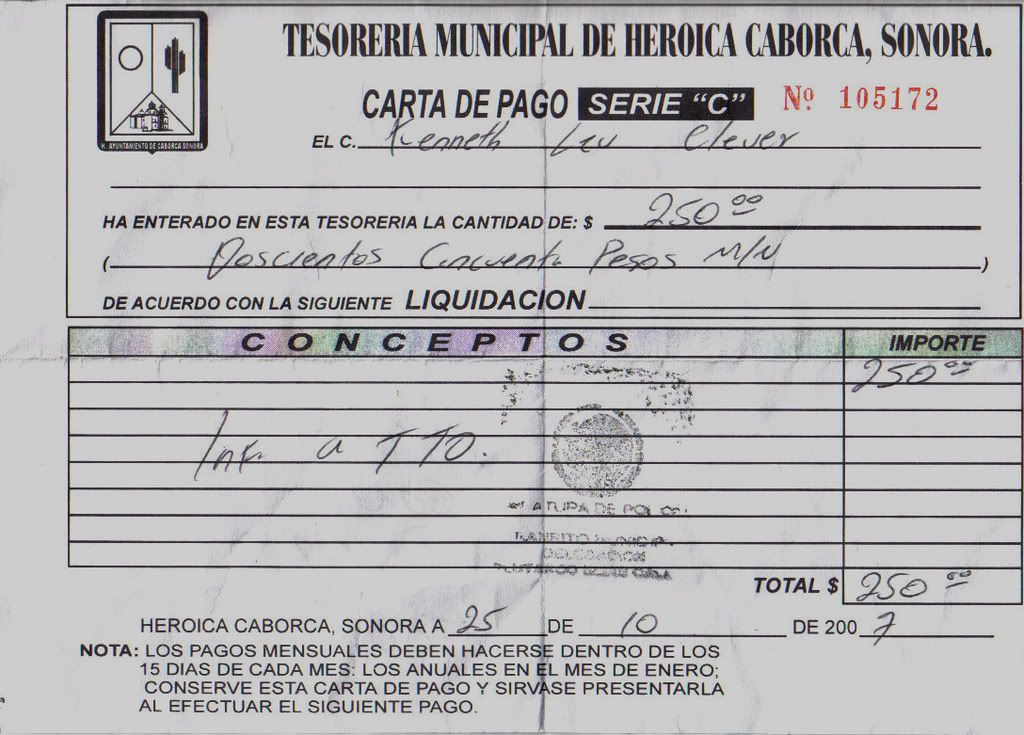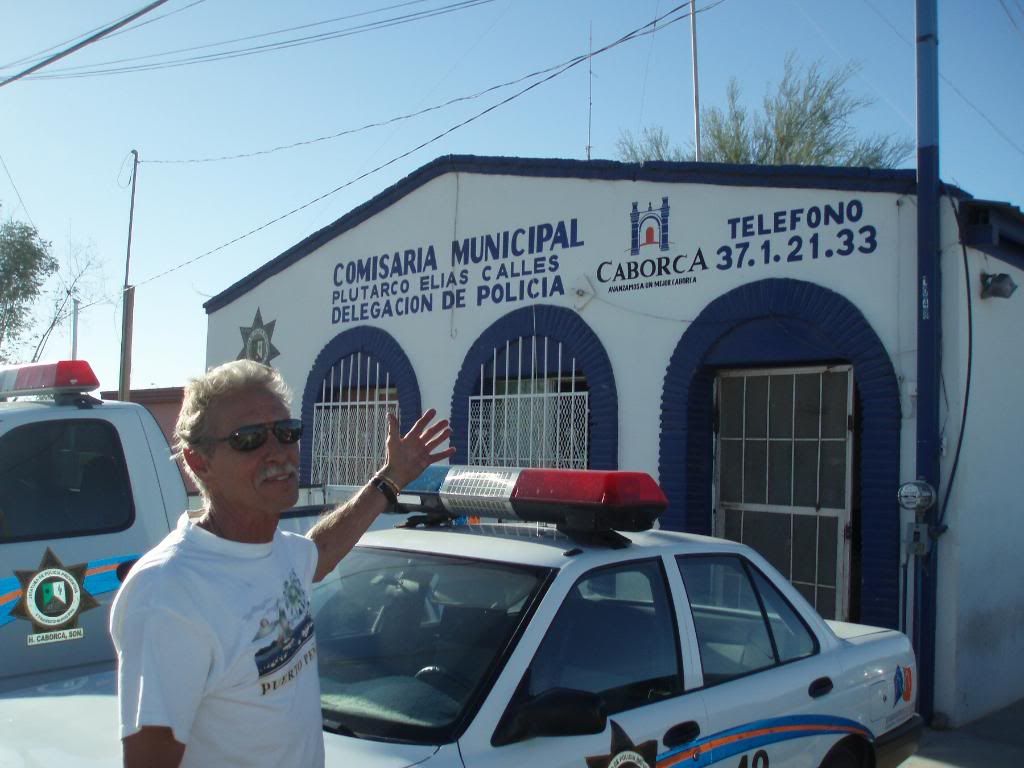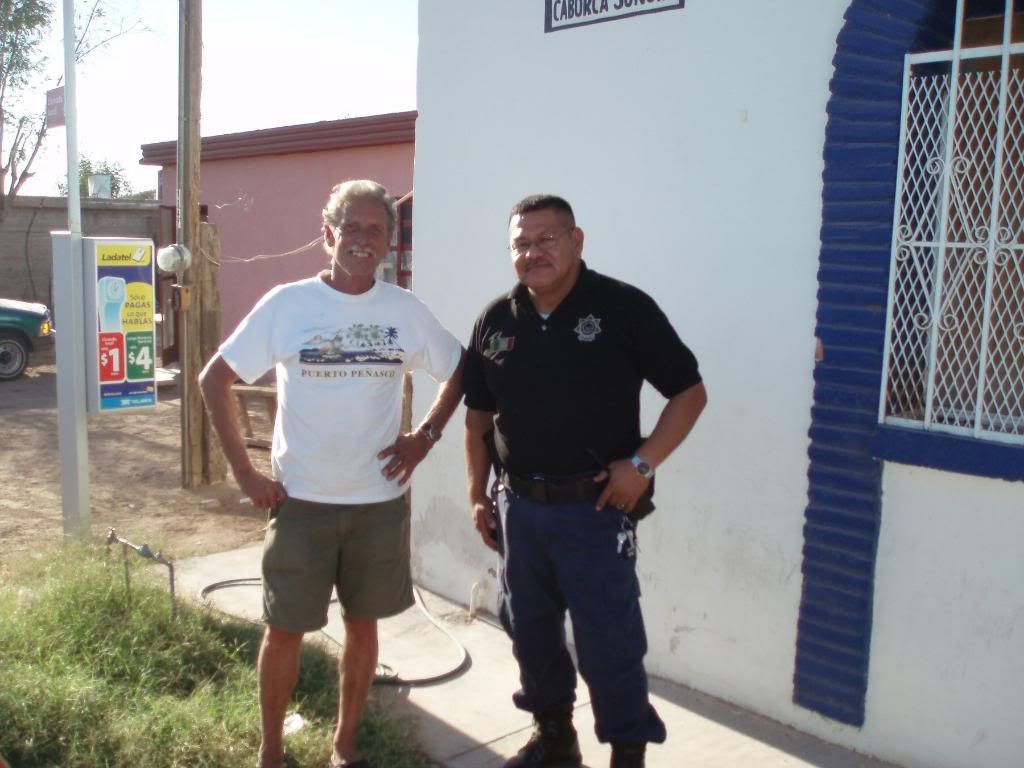Roberto
Guest
The worst I have run into personally are fathers who don't want to pay child support. One I met brags that he spent over $100K with lawyers to avoid paying. I called him on it and he offered to punch me !! Nice guy! There is an Arizona Court site that you can search names. I ran some names and it was interesting to see some are criminals in the US and upstanding citizens in Mexico. Even some on this forum
U.S. Catching More Fugitives in Mexico
Robert Anglen - Arizona Republicgo to original
Americans on the run in Mexico often head to places they know. For fugitives from Phoenix and Tucson, that often means the resort town of Rocky Point.
Four child molesters trying to escape lifetime probation walk away from a Mesa shelter. Long on hope and short on plans, the men flee to Mexico.
Since the days of Billy the Kid, Mexico has been seen as a sanctuary for fugitive outlaws: Make it south of the border and the law can't follow.
But these days, the law doesn't stop at the border. More than two dozen deputy U.S. marshals are venturing into all parts of Mexico, from Nogales to the Yucatan Peninsula, to bring back wanted criminals in record numbers.
In 1999, 14 fugitives who fled to Mexico were captured and returned to the United States. Last year, nearly 100 fugitives were captured and returned. The arrests are being enabled by newly created partnerships between the U.S. Marshals Service and Mexican authorities, arrangements that have led to creation of special units in Arizona and other border states.
U.S. marshals, some working in Mexico City, track the fugitives down; Mexican police make the arrests.
Among the recent captures are three of the Mesa molesters. After their walk-away in August, the men hid in Agua Prieta and Chihuahua, where they were arrested last month following an investigation that involved background searches, interviews, bank-account checks and old-fashioned police work.
"We look at everything," said Deputy U.S. Marshal Jose Valenzuela, who is assigned to the Mexico investigative-liaison unit in Phoenix. "We want to know their means of transportation, the way they (escaped), how they got there, who helped them and, some cases, why they stopped running."
Despite these successes, cases sometimes go bad. Paperwork snafus, slow-moving bureaucracy and communication errors allow some suspects to slip away.
"We have made great strides in establishing partnerships and rapport with Mexican police," said David Gonzales, an Arizona U.S. marshal. "We still have light-years to go in resolving paperwork and bureaucracy. . . . There are all kinds of loopholes for stopping the process."
Fleeing south
Americans on the run in Mexico often head to places they know. For fugitives from Phoenix and Tucson, that often means the resort town of Rocky Point.
Authorities often make jokes about fugitives walking the streets of Puerto Peñasco. The enclave on the Gulf of California is about a four-hour drive from Phoenix, and its hotels, restaurants and shops make the city instantly familiar.
"Rocky Point is a popular destination," said Supervisory Deputy U.S. Marshal Thomas Henman, who heads the child-predator apprehension unit. "It is close. It is Americanized. It is easy to blend in. And if you are a White male, it is easy to find work."
Manuel Barrios, director of the Sonora State Investigative Police, said the resort town of San Carlos is another draw.
"They come here to hide, in San Carlos, Hermosillo, (Puerto) Peñasco," he said. "They feel safer. It (Sonora) is a very peaceful area."
A romanticized notion of fugitives living the high life in other countries persists in movies and pulp novels: The criminal sets up digs in luxurious settings and lives there for years. But that scenario is rare. More often, the fugitives in Mexico are desperate and broke. If they cannot find work, they often end up begging for food and living outdoors.
Many of the fugitives are wanted for felonies such as murder and assault. They skip bail or sometimes escape from jail. Many have been found guilty; all have warrants for their arrest.
Getting to Mexico from the U.S. is relatively easy. Border crossings are open and people entering Mexico are rarely stopped and questioned like they are when entering the U.S.
According to investigators, the biggest factor influencing a fugitive's destination is family, who can provide food, money, shelter and help avoiding law enforcement.
That was the case with the four men who fled the Mesa shelter. Donald Temple, Matthew Ellsworth, Randy Brown and Manual Dominguez were all on lifetime probation in Maricopa County for molesting children.
"The reason they went to Chihuahua is because Dominguez had family down there," Valenzuela said. "The other three just went with him."

Temple, 25, and Ellsworth, 27, were arrested on Jan. 12 in Chihuahua, by Mexico state police. Five days later, Brown, 24, surrendered in Agua Prieta, Sonora. All were deported to the U.S.

But Dominguez, who authorities say was aided by relatives, is still free.

Cases go bad

No law-enforcement officer on either side of the border wants to see a fugitive go free. But sometimes it happens, and paperwork is to blame.

Adrian Cruz, a convicted child rapist who impregnated a 9-year-old, escaped from the Maricopa County Courthouse during a hearing in February 2009 after a sheriff's deputy left him alone in a holding cell.

In the ensuing search, deputies worked with the U.S. Border Patrol and the Marshals Service. Eight months later, marshals had tracked Cruz to Mexico City, where he had relatives.

As Mexican police prepared to move in and make an arrest, they hit a snag. Because Cruz is a Mexican citizen, authorities have to petition the Mexican government for an arrest warrant.

Usually, authorities have to only show paperwork, such as a birth certificate, to state police proving the fugitive is a U.S. citizen. Mexican police then make the arrest, and the fugitive is deported and turned over to U.S. marshals.
But in the case of Mexican fugitives seeking refuge in their own country, the government must first agree to the arrests. Then, the cases are heard in a Mexican court.
With Cruz, the issue was wording on the arrest warrant that the Mexican government would not approve. Authorities said he was identified as an escapee, a charge the Mexican government doesn't recognize. So, a new warrant had to be issued.
As authorities on both sides of the border waited with a growing sense of frustration, the leads on Cruz went cold. A few days later, authorities again picked up his trail when informants said Cruz was doing weekend work selling DVDs at a Mexico City plaza. The lead didn't pan out.
Valenzuela, who is determined to catch Cruz, pointed out other potential bureaucratic pitfalls in this and similar cases. Once captured, Cruz will go before a Mexican judge and may claim he is not the person being sought. That is because his Mexican birth certificate identifies him as Eleazar Cruz Colin.
To get Cruz back to the U.S., Valenzuela said authorities would have to follow a process that is virtually like building a new case.
Reciprocation
Mexico has its own share of fugitives, and they often head to El Norte, where marshals work to track them down on U.S. soil.
A recent case involved two members of a kidnapping ring in Mexico who videotaped the torture session of two victims and sent the tape to relatives to prompt a quick ransom payment. When the money was delivered, however, the kidnappers murdered the victims and fled with the money.
Marshals, with the help of Immigration and Customs Enforcement investigators, located the kidnappers and deported them.
"We help them out here, and they give us total support in catching (ours) over there," said Barrios, the Sonora police director.
That includes tracking down murder suspects, drug dealers and, in some cases, drug-cartel hit men hiding in border states.
The cooperation between international law-enforcement agencies is based more on mutual trust than formal agreements, Barrios said.
"They call us by telephone, or they'll send the photo by e-mail," he said. "We send it, along with any information we have, to all of the bases we have here: Agua Prieta, Santa Ana, Cananea, Obregon - to all of them. We have 72 bases. If they tell us that the (fugitive) is in Guaymas, we'll send it to Guaymas and they'll start looking . . . in hotels, restaurants, bars, on the street, in nightclubs."
On the U.S. side, there are 50 marshals in Arizona, California, New Mexico and Texas who serve as Mexico liaisons. Marshals also staff a Mexico City office, a hub for the rest of the country.
Two decades ago, such cooperation was unheard of, and the stories of U.S. police working illegally south of the border to hunt down a criminal were tinged with urban noir: Rogue cops tossed suspects into the trunk of a car, kidnapped them and brought them back to the U.S. to stand trial.
U.S. Catching More Fugitives in Mexico
Robert Anglen - Arizona Republicgo to original
Americans on the run in Mexico often head to places they know. For fugitives from Phoenix and Tucson, that often means the resort town of Rocky Point.
Four child molesters trying to escape lifetime probation walk away from a Mesa shelter. Long on hope and short on plans, the men flee to Mexico.
Since the days of Billy the Kid, Mexico has been seen as a sanctuary for fugitive outlaws: Make it south of the border and the law can't follow.
But these days, the law doesn't stop at the border. More than two dozen deputy U.S. marshals are venturing into all parts of Mexico, from Nogales to the Yucatan Peninsula, to bring back wanted criminals in record numbers.
In 1999, 14 fugitives who fled to Mexico were captured and returned to the United States. Last year, nearly 100 fugitives were captured and returned. The arrests are being enabled by newly created partnerships between the U.S. Marshals Service and Mexican authorities, arrangements that have led to creation of special units in Arizona and other border states.
U.S. marshals, some working in Mexico City, track the fugitives down; Mexican police make the arrests.
Among the recent captures are three of the Mesa molesters. After their walk-away in August, the men hid in Agua Prieta and Chihuahua, where they were arrested last month following an investigation that involved background searches, interviews, bank-account checks and old-fashioned police work.
"We look at everything," said Deputy U.S. Marshal Jose Valenzuela, who is assigned to the Mexico investigative-liaison unit in Phoenix. "We want to know their means of transportation, the way they (escaped), how they got there, who helped them and, some cases, why they stopped running."
Despite these successes, cases sometimes go bad. Paperwork snafus, slow-moving bureaucracy and communication errors allow some suspects to slip away.
"We have made great strides in establishing partnerships and rapport with Mexican police," said David Gonzales, an Arizona U.S. marshal. "We still have light-years to go in resolving paperwork and bureaucracy. . . . There are all kinds of loopholes for stopping the process."
Fleeing south
Americans on the run in Mexico often head to places they know. For fugitives from Phoenix and Tucson, that often means the resort town of Rocky Point.
Authorities often make jokes about fugitives walking the streets of Puerto Peñasco. The enclave on the Gulf of California is about a four-hour drive from Phoenix, and its hotels, restaurants and shops make the city instantly familiar.
"Rocky Point is a popular destination," said Supervisory Deputy U.S. Marshal Thomas Henman, who heads the child-predator apprehension unit. "It is close. It is Americanized. It is easy to blend in. And if you are a White male, it is easy to find work."
Manuel Barrios, director of the Sonora State Investigative Police, said the resort town of San Carlos is another draw.
"They come here to hide, in San Carlos, Hermosillo, (Puerto) Peñasco," he said. "They feel safer. It (Sonora) is a very peaceful area."
A romanticized notion of fugitives living the high life in other countries persists in movies and pulp novels: The criminal sets up digs in luxurious settings and lives there for years. But that scenario is rare. More often, the fugitives in Mexico are desperate and broke. If they cannot find work, they often end up begging for food and living outdoors.
Many of the fugitives are wanted for felonies such as murder and assault. They skip bail or sometimes escape from jail. Many have been found guilty; all have warrants for their arrest.
Getting to Mexico from the U.S. is relatively easy. Border crossings are open and people entering Mexico are rarely stopped and questioned like they are when entering the U.S.
According to investigators, the biggest factor influencing a fugitive's destination is family, who can provide food, money, shelter and help avoiding law enforcement.
That was the case with the four men who fled the Mesa shelter. Donald Temple, Matthew Ellsworth, Randy Brown and Manual Dominguez were all on lifetime probation in Maricopa County for molesting children.
"The reason they went to Chihuahua is because Dominguez had family down there," Valenzuela said. "The other three just went with him."

Temple, 25, and Ellsworth, 27, were arrested on Jan. 12 in Chihuahua, by Mexico state police. Five days later, Brown, 24, surrendered in Agua Prieta, Sonora. All were deported to the U.S.

But Dominguez, who authorities say was aided by relatives, is still free.

Cases go bad

No law-enforcement officer on either side of the border wants to see a fugitive go free. But sometimes it happens, and paperwork is to blame.

Adrian Cruz, a convicted child rapist who impregnated a 9-year-old, escaped from the Maricopa County Courthouse during a hearing in February 2009 after a sheriff's deputy left him alone in a holding cell.

In the ensuing search, deputies worked with the U.S. Border Patrol and the Marshals Service. Eight months later, marshals had tracked Cruz to Mexico City, where he had relatives.

As Mexican police prepared to move in and make an arrest, they hit a snag. Because Cruz is a Mexican citizen, authorities have to petition the Mexican government for an arrest warrant.

Usually, authorities have to only show paperwork, such as a birth certificate, to state police proving the fugitive is a U.S. citizen. Mexican police then make the arrest, and the fugitive is deported and turned over to U.S. marshals.
But in the case of Mexican fugitives seeking refuge in their own country, the government must first agree to the arrests. Then, the cases are heard in a Mexican court.
With Cruz, the issue was wording on the arrest warrant that the Mexican government would not approve. Authorities said he was identified as an escapee, a charge the Mexican government doesn't recognize. So, a new warrant had to be issued.
As authorities on both sides of the border waited with a growing sense of frustration, the leads on Cruz went cold. A few days later, authorities again picked up his trail when informants said Cruz was doing weekend work selling DVDs at a Mexico City plaza. The lead didn't pan out.
Valenzuela, who is determined to catch Cruz, pointed out other potential bureaucratic pitfalls in this and similar cases. Once captured, Cruz will go before a Mexican judge and may claim he is not the person being sought. That is because his Mexican birth certificate identifies him as Eleazar Cruz Colin.
To get Cruz back to the U.S., Valenzuela said authorities would have to follow a process that is virtually like building a new case.
Reciprocation
Mexico has its own share of fugitives, and they often head to El Norte, where marshals work to track them down on U.S. soil.
A recent case involved two members of a kidnapping ring in Mexico who videotaped the torture session of two victims and sent the tape to relatives to prompt a quick ransom payment. When the money was delivered, however, the kidnappers murdered the victims and fled with the money.
Marshals, with the help of Immigration and Customs Enforcement investigators, located the kidnappers and deported them.
"We help them out here, and they give us total support in catching (ours) over there," said Barrios, the Sonora police director.
That includes tracking down murder suspects, drug dealers and, in some cases, drug-cartel hit men hiding in border states.
The cooperation between international law-enforcement agencies is based more on mutual trust than formal agreements, Barrios said.
"They call us by telephone, or they'll send the photo by e-mail," he said. "We send it, along with any information we have, to all of the bases we have here: Agua Prieta, Santa Ana, Cananea, Obregon - to all of them. We have 72 bases. If they tell us that the (fugitive) is in Guaymas, we'll send it to Guaymas and they'll start looking . . . in hotels, restaurants, bars, on the street, in nightclubs."
On the U.S. side, there are 50 marshals in Arizona, California, New Mexico and Texas who serve as Mexico liaisons. Marshals also staff a Mexico City office, a hub for the rest of the country.
Two decades ago, such cooperation was unheard of, and the stories of U.S. police working illegally south of the border to hunt down a criminal were tinged with urban noir: Rogue cops tossed suspects into the trunk of a car, kidnapped them and brought them back to the U.S. to stand trial.
Last edited:



